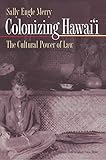Colonizing Hawai'i : The Cultural Power of Law / Sally Engle Merry.
Material type: TextSeries: Princeton Studies in Culture/Power/History ; 10Publisher: Princeton, NJ : Princeton University Press, [2020]Copyright date: ©2000Description: 1 online resource (432 p.) : 23 halftones 1 map 4 tablesContent type:
TextSeries: Princeton Studies in Culture/Power/History ; 10Publisher: Princeton, NJ : Princeton University Press, [2020]Copyright date: ©2000Description: 1 online resource (432 p.) : 23 halftones 1 map 4 tablesContent type: - 9780691221984
- Customary law -- Hawaii
- Customary law -- Hawaii
- Hawaiians -- Government relations
- Hawaiians -- Legal status, laws, etc
- Hawaiians -- Politics and government
- SOCIAL SCIENCE / Anthropology / General
- Afghanistan
- Baker, James
- Blackwell, David
- Caucus-race
- Chappaquiddick
- Durkheim, Emile
- Ford, Gerald
- Gephardt, Richard
- Hart, Gary
- Hodgson, Godfrey
- Houston Chronicle
- Iran hostage crisis
- Jordan, Hamilton
- Joslyn, Richard
- Kemp, Jack
- Kennedy, Robert
- Lydon, Christopher
- McGovern-Fraser commission
- Nevada primary
- Ohio primary
- Opus (penguin)
- Reagan, Ronald
- Sanford, Terry
- ambiguity
- approval voting
- brokered convention
- campaign effects
- campaign effort
- character traits
- contagion
- conventions
- cue-taking
- deathwatch coverage
- delegates
- environmental protection
- expectations
- feeling thermometer
- foreign policy
- government services
- horse race
- information
- labor unions
- liberalism scores
- logit analysis
- media use
- momentum
- nuclear power
- paradox of voting
- party identification
- projection
- representation
- rules
- 996.9 22
- DU624.65
- DU624.65 .M47 2000eb
- online - DeGruyter
| Item type | Current library | Call number | URL | Status | Notes | Barcode | |
|---|---|---|---|---|---|---|---|
 eBook
eBook
|
Biblioteca "Angelicum" Pont. Univ. S.Tommaso d'Aquino Nuvola online | online - DeGruyter (Browse shelf(Opens below)) | Online access | Not for loan (Accesso limitato) | Accesso per gli utenti autorizzati / Access for authorized users | (dgr)9780691221984 |
Frontmatter -- CONTENTS -- LIST OF ILLUSTRATIONS -- ACKNOWLEDGMENTS -- A NOTE ON LANGUAGE AND TERMINOLOGY -- ONE Introduction -- PART ONE: ENCOUNTERS IN A CONTACT ZONE: NEW ENGLAND MISSIONARIES, LAWYERS, AND THE APPROPRIATION OF ANGLO-AMERICAN LAW, 1820-1852 -- TWO The Process of Legal Transformation -- THREE The First Transition: Religious Law -- FOUR The Second Transition: Secular Law -- PART TWO: LOCAL PRACTICES OF POLICING AND JUDGING IN HILO, HAWAI'I -- FIVE The Social History of a Plantation Town -- SIX Judges and Caseloads in Hilo -- SEVEN Protest and the Law on the Hilo Sugar Plantations -- EIGHT Sexuality, Marriage, and the Management of the Body -- NINE Conclusions -- APPENDIXES -- NOTES -- REFERENCES -- INDEX
restricted access online access with authorization star
http://purl.org/coar/access_right/c_16ec
How does law transform family, sexuality, and community in the fractured social world characteristic of the colonizing process? The law was a cornerstone of the so-called civilizing process of nineteenth-century colonialism. It was simultaneously a means of transformation and a marker of the seductive idea of civilization. Sally Engle Merry reveals how, in Hawai'i, indigenous Hawaiian law was displaced by a transplanted Anglo-American law as global movements of capitalism, Christianity, and imperialism swept across the islands. The new law brought novel systems of courts, prisons, and conceptions of discipline and dramatically changed the marriage patterns, work lives, and sexual conduct of the indigenous people of Hawai'i.
Mode of access: Internet via World Wide Web.
In English.
Description based on online resource; title from PDF title page (publisher's Web site, viewed 02. Mrz 2022)


